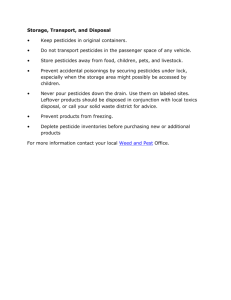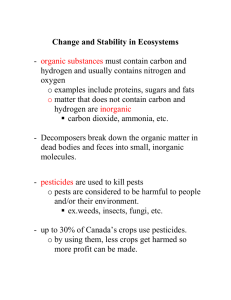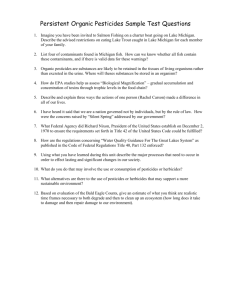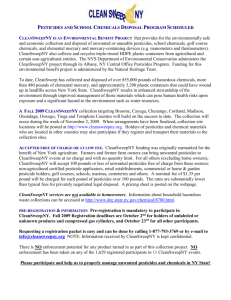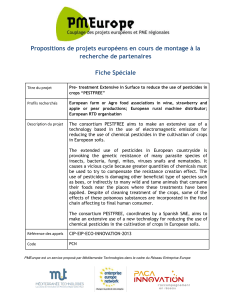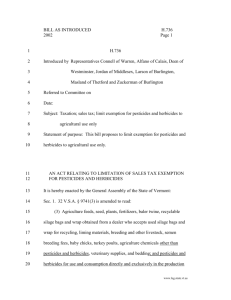are pesticides so bad?
advertisement
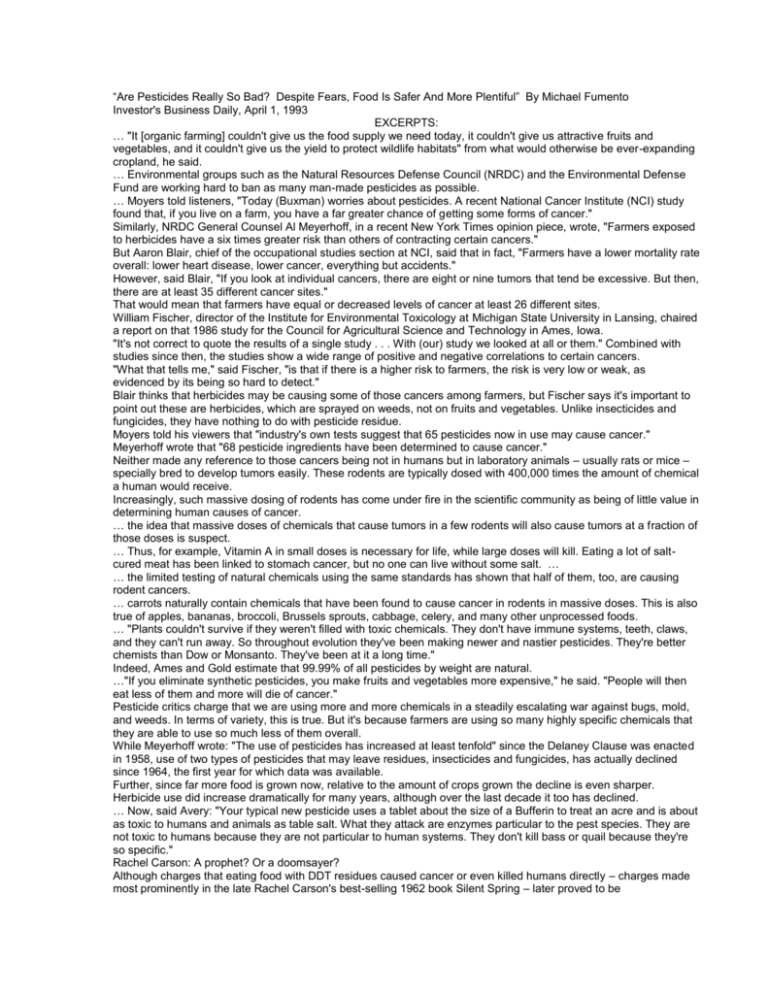
“Are Pesticides Really So Bad? Despite Fears, Food Is Safer And More Plentiful” By Michael Fumento Investor's Business Daily, April 1, 1993 EXCERPTS: … "It [organic farming] couldn't give us the food supply we need today, it couldn't give us attractive fruits and vegetables, and it couldn't give us the yield to protect wildlife habitats" from what would otherwise be ever-expanding cropland, he said. … Environmental groups such as the Natural Resources Defense Council (NRDC) and the Environmental Defense Fund are working hard to ban as many man-made pesticides as possible. … Moyers told listeners, "Today (Buxman) worries about pesticides. A recent National Cancer Institute (NCI) study found that, if you live on a farm, you have a far greater chance of getting some forms of cancer." Similarly, NRDC General Counsel Al Meyerhoff, in a recent New York Times opinion piece, wrote, "Farmers exposed to herbicides have a six times greater risk than others of contracting certain cancers." But Aaron Blair, chief of the occupational studies section at NCI, said that in fact, "Farmers have a lower mortality rate overall: lower heart disease, lower cancer, everything but accidents." However, said Blair, "If you look at individual cancers, there are eight or nine tumors that tend be excessive. But then, there are at least 35 different cancer sites." That would mean that farmers have equal or decreased levels of cancer at least 26 different sites. William Fischer, director of the Institute for Environmental Toxicology at Michigan State University in Lansing, chaired a report on that 1986 study for the Council for Agricultural Science and Technology in Ames, Iowa. "It's not correct to quote the results of a single study . . . With (our) study we looked at all or them." Combined with studies since then, the studies show a wide range of positive and negative correlations to certain cancers. "What that tells me," said Fischer, "is that if there is a higher risk to farmers, the risk is very low or weak, as evidenced by its being so hard to detect." Blair thinks that herbicides may be causing some of those cancers among farmers, but Fischer says it's important to point out these are herbicides, which are sprayed on weeds, not on fruits and vegetables. Unlike insecticides and fungicides, they have nothing to do with pesticide residue. Moyers told his viewers that "industry's own tests suggest that 65 pesticides now in use may cause cancer." Meyerhoff wrote that "68 pesticide ingredients have been determined to cause cancer." Neither made any reference to those cancers being not in humans but in laboratory animals – usually rats or mice – specially bred to develop tumors easily. These rodents are typically dosed with 400,000 times the amount of chemical a human would receive. Increasingly, such massive dosing of rodents has come under fire in the scientific community as being of little value in determining human causes of cancer. … the idea that massive doses of chemicals that cause tumors in a few rodents will also cause tumors at a fraction of those doses is suspect. … Thus, for example, Vitamin A in small doses is necessary for life, while large doses will kill. Eating a lot of saltcured meat has been linked to stomach cancer, but no one can live without some salt. … … the limited testing of natural chemicals using the same standards has shown that half of them, too, are causing rodent cancers. … carrots naturally contain chemicals that have been found to cause cancer in rodents in massive doses. This is also true of apples, bananas, broccoli, Brussels sprouts, cabbage, celery, and many other unprocessed foods. … "Plants couldn't survive if they weren't filled with toxic chemicals. They don't have immune systems, teeth, claws, and they can't run away. So throughout evolution they've been making newer and nastier pesticides. They're better chemists than Dow or Monsanto. They've been at it a long time." Indeed, Ames and Gold estimate that 99.99% of all pesticides by weight are natural. …"If you eliminate synthetic pesticides, you make fruits and vegetables more expensive," he said. "People will then eat less of them and more will die of cancer." Pesticide critics charge that we are using more and more chemicals in a steadily escalating war against bugs, mold, and weeds. In terms of variety, this is true. But it's because farmers are using so many highly specific chemicals that they are able to use so much less of them overall. While Meyerhoff wrote: "The use of pesticides has increased at least tenfold" since the Delaney Clause was enacted in 1958, use of two types of pesticides that may leave residues, insecticides and fungicides, has actually declined since 1964, the first year for which data was available. Further, since far more food is grown now, relative to the amount of crops grown the decline is even sharper. Herbicide use did increase dramatically for many years, although over the last decade it too has declined. … Now, said Avery: "Your typical new pesticide uses a tablet about the size of a Bufferin to treat an acre and is about as toxic to humans and animals as table salt. What they attack are enzymes particular to the pest species. They are not toxic to humans because they are not particular to human systems. They don't kill bass or quail because they're so specific." Rachel Carson: A prophet? Or a doomsayer? Although charges that eating food with DDT residues caused cancer or even killed humans directly – charges made most prominently in the late Rachel Carson's best-selling 1962 book Silent Spring – later proved to be unsubstantiated, DDT prompted concern that it was causing havoc in the ecosystem because it persisted in the body's tissue and could thus be passed along the food chain. According to the National Agricultural Chemicals Association, however, none of the pesticides still in use on American crops are persistent. DDT itself was a tremendous improvement over previous non-synthetic chemical pesticides. It was treated as a miracle chemical when it first appeared and given credit for saving millions of lives, according to the World Health Organization. But DDT was banned in 1972 before other chemicals were ready to take its place, a ban that some scientists claim shows the damage that anti-pesticide extremism can cause. In one case, Silent Spring led to the government of Sri Lanka halting the spraying of mosquitoes. Consequently, the incidence of malaria jumped from nearly zero to 2,500,000 cases and 10,000 deaths before the country began spraying again. Compare this to known deaths caused by DDT – none. Carson's book was "a real travesty," said Thomas Jukes, a professor of biophysics at Berkeley who has studied the health effects of DDT since 1963. "Millions of people were dusted with it and sprayed with it to kill lice and fleas and it never did anyone any harm." … The bottom line is that fruit productivity per acre has been increasing, with significantly higher yields in the past decade than the one before. … Cornell's Roush said that when he was a member of the NRDC, the Environmental Defense Fund, and the National Wildlife Federation, "I read consistently in their literature that we have alternatives and we just get (farmers) to use them. But the alternatives aren't there." A 1990 report of the Council for Agricultural Science and Technology in Ames, Iowa, which comprises 29 scientific societies along with some for-profit companies, stated that alternatives "will have no major impact on the total amount of pesticides required for fruit and vegetable production in the next few years. "This is due to the lack of satisfactory alternatives rather than any reluctance on the part of producers to eliminate pesticides whenever economically feasible." This is especially the case for herbicides and fungicides.
